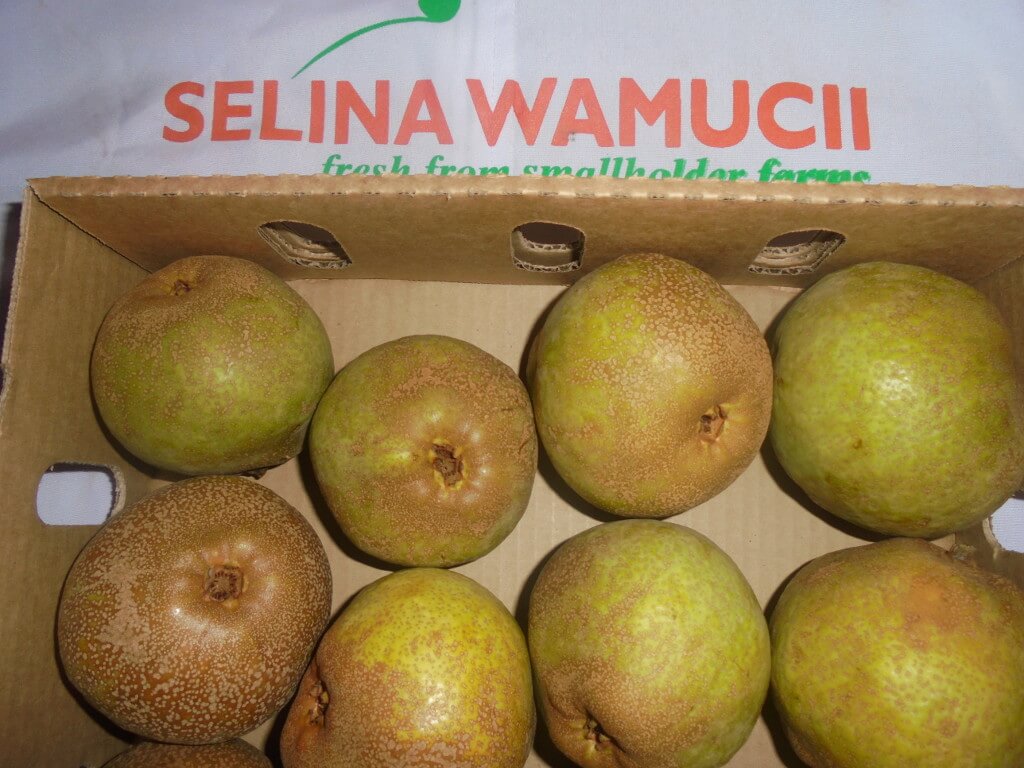Buy Kenya Pears Directly From Exporters & Suppliers - Best of 2024 Market Prices
Get Instant QuoteSelina Wamucii is proud to offer our clients high quality fresh Kenya pears at fair prices. We source our carefully selected pears from family growers in our farmers program.
Kenya Pears are some of the most abundant fruits in Kenya and indeed the second most essential fruit in the whole of the tropics. In the year 2004, the Food and Agricultural Association (FAO), an arm of the United Nations confirmed 19.2 tons worth of shipments of the fruit across the globe.

Historically, Kenya pear appeared in it two forms, first in Asia, around 3000B.C. This Asian type, Pyres Serotina came first in Central China and in Japan. The fruit was also common in western Europe even before the Christ in a species different from the Asian kind. It was known as Pyrus Communis and was a popular source of food to the then undeveloped central Europeans who consumed it long before the age of agriculture.
Despite its popularity, the crunchy, sugary, firm fruit would not find trustees eager enough to cultivate it until the early 1500s, what we call the Renaissance in Europe. This is when some new varieties came to the light. However, it was not until the 1800s that the Chinese would ship their species to the US where the pear, once and for all time, began its dispersal to the rest of the world. It is from here that the current Kenya pear was born.
The Kenya pear tree grows as high as 10 meters at maximum. It has a deficiency in leaves and equally diminished spurs which bear fruit but plenty of branches to compensate all that. The tree grows in the same manner as the apple with the addition that the flowers may appear even prior to the leaves or both come out together. From fruit budding to ripening, you have to wait for at least four to five months.
The best way to grow Kenya pears is either by seed or use of stems. The seed of the tree is not the favorite way of growing the fruit since it may lead to dwarf or underdeveloped fruits. This is why use of rootstock with hardwood sections and mixing them with international varieties like Kieffer goes very well with grafting Asian-Kenyan pears. However, if you still want to use the seed, you need to keep it below 4 degree Celsius under cooling conditions for about two to three-and-a-half months before planting.
Kenya pear trees grow best in area above 1700 meters altitude, with the prime places being around Mount Kenya, Limuru and Tigoni. Though, the hardier Asian varieties have an affinity for growing in lower altitudes only that the soil must remain true to the loam, fertile kind that the cooler regions of Kenya provide readily.
In terms of maintenance, Kenya pear trees do not have to undergo excessive pruning. This is because the tree is more or less upright. However, you can help decide how the branches spread by pruning in a triangular method by diminishing growth below and letting a canopy develop on top.
Kenya pears mature after 36 to 60 from the date of planting. In order to ensure that the fruits are heavy enough and of appropriate taste and shade, it is only good to ‘prune’ the worst and leave the best. This is because sometimes they can bear many fruits all at once at the expense of quality.
Harvesting of pears in Kenya happens under very careful conditions with them by hand being most recommended. The fruit is knowledgeably harvestable when there is presence of a little flush in the exterior or when the seed changes to a clear brown. Another way to test its readiness for the market is if the stalk shelves easily off the stem when touched. Kenya pears can be consumed only after a few days of storage after picking since by then they will have turned fully ripe.
Some of the healthy benefits of Kenya pears include:
- Fiber development which helps in digestion.
Monounsaturated fat at 0.1 grams per 100g of nutrients for fighting bad cholesterol in blood. - Energy giving components with 102 calories.
With its 7 milligrams of vitamin C, the fruit helps prevent many diseases as well as bosting immunity. - It is also a natural antioxidant that fights against toxins in the body against tumorous growths.
Selina Wamucii is always on the go sourcing the freshest Kenya pears from family growers. Whenever you need the best, we’ll be there to deliver!
Get Instant Quote
Are you a producer of Kenya Pears or other products?
Sign up today for FREE to buy or sell Kenya Pears.

